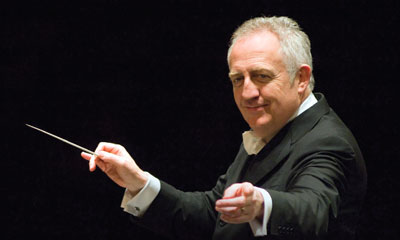Tovey, Terfel and BSO deliver a deeply moving Brahms Requiem
By his early thirties, life had dealt Johannes Brahms two significant blows. His mentor Robert Schumann was dead, having wasted away in a sanitarium after attempting suicide in 1854. And in 1865, Brahms’ mother died, causing the composer seemingly no end of grief. The two deaths were the inspiration for his longest and most personal work, Ein deutsches Requiem, performed this weekend by the Boston Symphony Orchestra.
The Requiem, completed in 1868, is a non-liturgical setting of texts from the Apocrypha and German Lutheran Bible. Rather than the hell, fire, and brimstone of the Catholic funeral mass, Brahms’ nearly eighty-minute account relays a message of condolence in times of sorrow. Christ is curiously absent. It was, as biographer Jan Swafford described, “[Brahms’] response to death as a secular, skeptical, modern man.” The Requiem’s effect, as a result, leans toward the universal, the work an appeal to comfort in the face of death.
The performance at Symphony Hall Thursday night was radiant, with conductor Bramwell Tovey leading the BSO and Tanglewood Festival Chorus in a sumptuous reading of the score. The soloists for the evening were bass-baritone star Bryn Terfel and soprano Rosemary Joshua, who made her BSO debut.
The Welsh-born soprano is noted as a Handel singer, and the light, nimble texture of her voice well suited the delicate phrases in her solo spotlight, the moving “Ihr habt nun traurigkeit.” Angelic as her tone was, Joshua’s diction wasn’t always clear, her lines lacking a ringing quality as a result. But that didn’t spoil her most poignant singing, which came at movement’s end. There, the phrase “aber ich will euch wieder sehen” (“but I will see you again”) flows in continuous streams as if in weeping. With glimmering and haunting touch, Joshua gave the lines the twinge of sorrow.
Bryn Terfel sang with cutomary conviction, his phrases sounding full without overshadowing the gently flowing wind and string accompaniment of “Herr, lehre doch mich.” He delivered the “Siehe, ich sage euch ein Geheimnis” with rich, vibrant tone and the declamatory precision of a preacher’s Sunday sermon. The climactic phrase of the movement, “Denn es wird die Posaune schallen,” filled the hall with trumpeting power.
The heroes of the evening were the members of the Tanglewood Festival Chorus, prepared by Bill Cutter, who sang with crystalline diction and a tender emotional touch. Their rendering of the briskly moving chorus “Wie lieblich sind deine Wohnungen” crested and broke in gentle waves. Some of the most reverent singing came in the final movement, “Selig sind die Toten,” where the sopranos, tenors, and basses spun their melodies into a tapestry of rich sound, the text’s message of “Blessed are the dead” left to glow in the hall like faint light. Tovey and the orchestra supplied a velvety cushion of accompaniment. Warm solos from the oboe and flute peaked out every so often to add color to the textures of this majestic score.
The concert opened with Terfel as soloist in the Boston Symphony Orchestra’s first performance of Bach’s Cantata No. 82, “Ich habe genug.” Here too, death is a permeating theme, though the work’s message is one of rapture as the soloist anxiously anticipates the end of his days after accepting Christ as savior. Historically informed listeners would have noticed the fine romantic touch that Tovey and orchestra gave this music. But the warm rendering mined the inner sorrow from this most famous of Bach’s solo cantatas.
Terfel found the full range of the cantata’s text. He softened his lines where necessary, the closing phrases of the central aria “Schlummert ein” sounding at a near whisper to capture the music’s call for sweet peace and quiet rest. The singer delivered the recitatives with diction as precise as spring-water clarity. The final aria was taken at a brisk pace, the lines moving with a rippling energy to fit the pinnacle phrase, “Ich freue mich auf meinen Tod.” Terfel sang it with immediacy, as if a man happily looking forward to his death.
In the opening and closing arias, oboist John Ferrillo lofted elegant lines over the supple phrases emanating from the twenty-piece orchestra, which sounded resplendent throughout. In each movement, Tovey conducted with gentle waving gestures as if to caress the melodies that streamed forth from the ensemble. Bach’s cantata is an intensely moving score, and the conductor led a most affecting performance.
The program will be repeated 1:30 p.m. Friday and 8 p.m. Saturday at Symphony Hall. bso.org; 617-266-1492
Posted in Performances

Posted Oct 26, 2014 at 3:27 pm by Memorie Munson
Wow! What a review! Now I understand what all the weeping was about!
Posted Oct 27, 2014 at 10:33 pm by FJB
great performance